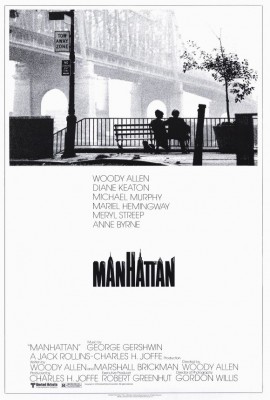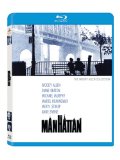| Reviews & Columns |
|
Reviews DVD TV on DVD Blu-ray 4K UHD International DVDs In Theaters Reviews by Studio Video Games Features Collector Series DVDs Easter Egg Database Interviews DVD Talk Radio Feature Articles Columns Anime Talk DVD Savant Horror DVDs The M.O.D. Squad Art House HD Talk Silent DVD
|
DVD Talk Forum |
|
|
| Resources |
|
DVD Price Search Customer Service #'s RCE Info Links |
|
Columns
|
|
|
Manhattan
And yet, I hadn't seen it at all after that, certainly not in the last 20-plus years. I never saw the DVD, and in fact I had stopped going to Allen's new movies pretty much altogether, though I've since seen a few on DVD or Blu-ray recently.
The effect of all this is that, more than most, for me watching Manhattan again was a real time-trip. I felt like Rod Taylor in The Time Machine. The picture, certainly in Allen's top five or six, holds up. It's still very funny, totally engrossing, as beautiful to look at as its George Gershwin score is to listen to, and at the end it's unexpectedly quite touching, with Allen pulling off a clever variation/homage to Chaplin's City Lights.
It's also become something of a museum piece, capturing forever its time and place in a way that's romantic and satirical at once, and with hindsight amuses in the same way '70s audiences found movies from the 1950s quaint in terms of what they had to say about that era.
MGM/Fox's Blu-ray is a stunner: the black and white, Panavision cinematography by the great Gordon Willis is indescribably gorgeous. Manhattan has since changed dramatically and irreversibly since then. After 9/11, Woody Allen himself made a rare appearance, at the Academy Awards to introduce a series of film clips honoring the city, with footage from Manhattan figuring prominently. (Manhattan itself, however, avoids the cliché of '70s and '80s films showing off the World Trade Center as part of the New York skyline. In the film it's visible in just one shot and barely noticeable at that.) The disc includes a high-def trailer but no other extras.
Allen plays Isaac Davis, a middle-aged comedy writer for a banal, Saturday Night Live-type sketch show. He abruptly quits his job in order to write a long-in-gestation novel, but is soon overwhelmed with anxiety about his professional future. More significantly, he becomes involved with two very different women: Tracy (Mariel Hemingway), a 17-year-old high school student, and Mary (Diane Keaton), a pretentious, high-maintenance "Radcliffe tootsie" on the rebound after breaking up with Isaac's married best friend, Yale (Michael Murphy).
Isaac much prefers Tracy. They truly enjoy one another despite their age difference, though he refuses to take the relationship seriously. Mary drives Isaac bonkers with her snobbery (she and Yale maintain an "Academy of the Overrated" that includes the likes of Ingmar Bergman), sanctimonious attitude (about to lose an argument: "What can I say? I'm from Philadelphia. We believe in God"), and shameless posing (she likes to shock, awkwardly inserting crude profanity into her conversation). It's one of those mutually self-destructive relationships everyone else can see a mile away.
Keaton, as Mary, gives one of her best and most memorable performances. In theaters especially, one really wanted to reach up into the screen and strangle her, so hilariously irritating is her character, and so true to life. As Tracy, Hemingway was herself just 17 at the time and inexperienced, but Allen captures her doe-like innocence and she comes off as absolutely genuine.
Like the song says, time changes everything. When I saw Close Encounters in 1977, my reaction was, "Isn't it great! Richard Dreyfuss gets to fly off into outer space with the aliens!" Now it's, "Imagine - abandoning your kids to fulfill some stupid self-validation!" (Director Steven Spielberg now apparently feels exactly the same way.) Dustin Hoffman's panicked reaction to a playground accident involving his son (in Kramer vs. Kramer) left me cold in 1979 but now, as the father of a four-year-old, I watched this scene again in abject horror and empathy.
When Manhattan was new, Isaac and Yale and Mary and Tracy lived in what seemed like paradise, an urban Mecca of culture and intelligent conversation, of used bookstores galore and repertory movie theaters showing obscurities like Hiroshi Inagaki's Chushingura. They ate at sidewalk cafés and places familiar even to those who've never been to New York: Elane's, the Russian Tea Room, etc.
I didn't end up in Manhattan - Kyoto's no shabby substitute, mind you - but the idealized Manhattan of Allen's films, this one in particular, profoundly impacted the direction of my late-teens and all of my twenties, and those of many of my friends, most of whom ended up moving out of the Midwest to places like New York, San Francisco, or like me out of the country entirely.
And now I'm older than Allen, Keaton, and Murphy all were when they made Manhattan, and the attitudes of the characters they play, while still nostalgically recognizable, are also amusing in unexpected ways. While Allen makes endless fun of self-involved Mary and her pretensions, Isaac and Yale come off no better. Allen's clearly critical of Yale's rationalizing of his adulterous relationship with Mary, but Isaac himself comes off as a self-absorbed whiner, if an amusing one.
Only Tracy is completely genuine and without pretensions. Isaac may make fun of her lack of familiarity with the iconography of his generation, Veronica Lake, for instance, but maybe Allen envies that innocence in the same way he envies those with a fervent faith in the afterlife, that faith is sometimes better than informed cynicism.
Video & Audio
High marks. Filmed in black and white Panavision, Manhattan's high-def transfer is basically flawless. The image is sharp with rich contrasts throughout, with an eye-pleasing level of film grain reminding the viewer that this was shot on film and not tweaked outrageously with DNR. The region A-encoded disc offers a fine DTS-HD Master Audio mono track, along with optional French and Spanish mono, and subtitles in all three languages. There are hidden languages as well, as my Japanese PlayStation 3 defaulted to Japanese menu screens and Japanese audio and subtitles options.
Extra Features
The lone extra is an original trailer, in high-def, that might have been created by Allen himself. It sells the film well in any case.
Parting Thoughts
Manhattan made me want to go back and revisit all of Allen's '70s and '80s films, as well as catch up with those I've missed. It's one of the all-time great comedies, and this Blu-ray offers a splendid presentation. Only the absence of worthy supplements falls short. Highly Recommended.
Film historian Stuart Galbraith IV's latest book, Japanese Cinema, is on sale now.
|
| Popular Reviews |
| Sponsored Links |
|
|
| Sponsored Links |
|
|
| Release List | Reviews | Shop | Newsletter | Forum | DVD Giveaways | Blu-Ray | Advertise |
|
Copyright 2024 DVDTalk.com All Rights Reserved. Legal Info, Privacy Policy, Terms of Use,
Manage Preferences,
Your Privacy Choices | |||||||














